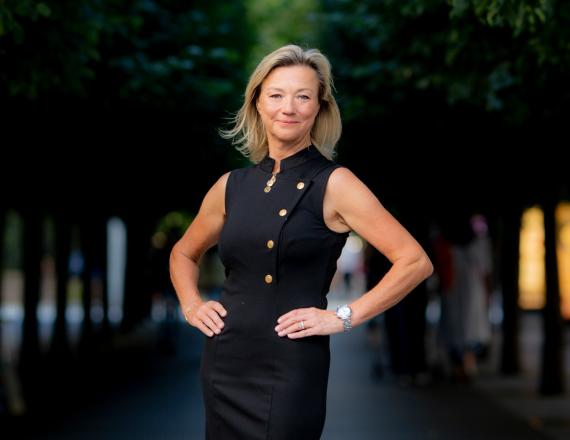$4.5 Million in Gifts to Support Student Mental Health
Dartmouth College alumna and cardiologist Holly Andersen D ’85 wants medical students to thrive and to experience the joy of being a physician. Her recent $2.5 million gift in support of student mental health at the Geisel School of Medicine brings the total raised for the Healthy Students, Healthy Physicians program to $4.5 million. The program, launched in 2020, benefits all Geisel students and provides access to free confidential counseling, mental health screening, resilience skills-training, and a variety of other supports and special programming.

“There’s no question that we need to improve the mental health of physicians in our country,” says Andersen, an attending cardiologist at New York-Presbyterian/Weill Cornell Medical Center. “We don’t want physicians who are cynical, exhausted and burnt out. That leads to more medical errors, the depersonalization of patients, and unhappiness for everybody.”
Even after 30 years of clinical practice, she still finds joy in her profession: “We get to help people, using our hands, our knowledge, and our creativity. It’s an incredible job.”
Andersen also serves on the Geisel Board of Advisors, is a member of the Dartmouth College Centennial Circle of alumnae, and, along with her husband, Doug Hirsch D ’85, is a strong supporter of scholarships at Geisel and Dartmouth.
Seeding and Leading Change
National statistics show high rates of depression and suicidal thinking among medical students and physicians, even though they begin their professional journey with better mental health than the general population. With the support of Andersen’s gift and that of an anonymous Dartmouth College alumnus and spouse, Geisel is planting the seeds of change within medical education and among physicians. The school seeks to raise an additional $5.5 million to fully endow the program and ensure such supports are available to future generations of students.
“We want to create a community in which developing resilience is part of training and seeking mental healthcare is seen as a sign of strength and not a personal weakness or professional liability,” explains Matthew Duncan MED ’01, an assistant professor of psychiatry at Geisel and leader of the program.
So far, feedback from students about the program has been overwhelmingly positive. One-third of all Geisel students have used the confidential counseling service since early 2020, with an average rating of 9.5 (10 indicates “extremely likely” to recommend). Student comments point to the accessibility of the service and the benefits they gain from even one or two sessions.
“I [now] have tangible tasks I can work on and learned some techniques to help me with my stress and anxiety, and these are things I wouldn’t have learned otherwise,” shared one student.
Andersen and Duncan are hopeful that Geisel’s program may inspire other institutions within higher education and lead to change at a national level.
“If we can get this right at Geisel and share what we learn and accomplish, this approach could spread nationally to other medical schools,” says Andersen. The benefits of which will be felt by physicians, healthcare professionals, and the patients they serve for decades to come.
To make a gift in support of Healthy Students, Healthy Physicians, visit geiselcampaign.dartmouth.edu or contact Matthew P. Haag in the Office of Development at (603) 646-5130.